
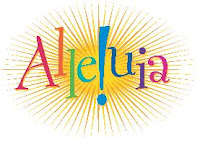 Fourth Sunday of Easter
Fourth Sunday of EasterGospel reading: John 10:11-18
vs.11 I am the good shepherd: the good shepherd is one who lays down his life for his sheep.
vs.12 The hired man, since he is not the shepherd and the sheep do not belong to him, abandons the sheep and runs away as soon as he sees a wolf coming, and then the wolf attacks and scatters the sheep;
vs.13 this is because he is only a hired man and has no concern for the sheep.
vs.14 I am the good shepherd; I know my own and my own know me,
vs.1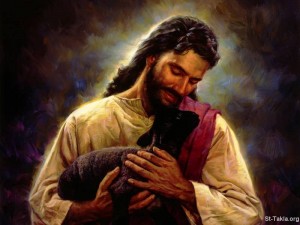 5 just as the Father knows me and I know the Father; and I lay down my life for my sheep.
5 just as the Father knows me and I know the Father; and I lay down my life for my sheep.
vs.16 And there are other sheep I have that are not of this fold, and these I have to lead as well. They too will listen to my voice, and there will be only one flock, and one shepherd.
vs.17 The Father loves me, because I lay down my life in order to take it up again.
vs.18 No one takes it from me; I lay it down of my own free will, and as it is in my power to lay it down, so it is in my power to take it up again; and this is the command I have been given by my Father."
******************************************
****************************************
Michel DeVerteuil
Lectio Divina with the Sunday Gospels
www.columba.ie
General Comments
It is an ancient custom in our Catholic Church that this fourth Sunday of Easter time is given to a reflection on chapter 10 of St John's gospel, with its theme of Jesus as the Good Shepherd. In each of the three years of the lectionary, on this Sunday we spend time on just one section of the chapter, reflecting on it.
In more recent years, it has also become customary that on this Sunday we remember specially our Church's need for more people who will give themselves to the task of shepherding God's people. They do so by joining the ministry of the entire Church. On this Sunday then, we pray for more and better vocations to the priesthood. This year's passage goes from verses 11 to verse 18.
 - Verses 11 - 13: the passage starts off by establishing a striking contrast between two people: the good shepherd, and the hireling.
- Verses 11 - 13: the passage starts off by establishing a striking contrast between two people: the good shepherd, and the hireling.
Good shepherds are noted because they are willing to lay down their lives for their sheep. Everyone in the world will feel touched by this fact of history which we can all see and appreciate - even though in our culture we may have in fact no shepherds to point to. The sheep belong to them, and they really care for them. Whatever happens to the sheep also touches them.
There were and still are others, however, who look after their sheep not as their own but simply as "hirelings". They are in charge of the sheep but have their own way of dealing with them. They don't have a feel for their sheep; they have never given anything of themselves personally to them.
As soon as they see a wolf (or some such hostile being) coming, they run away. They know the sheep do not belong to them, are not really one of theirs, and so they abandon them. Then we know what happens: the wolf attacks and scatters the sheep, sending them off in different directions. Now they will look for other green spots wherever they can find them. The places they look to will obviously include some which are not true pastures at all; they will provide new opportunities but will not be true "places where green grass is greener and available". In other words, sheep often do not find a place for their pasture, a place to relax and be fed with good food.
The so-called 'hirelings' included many in the audience at the time of Jesus. We think of people like the scribes, the pharisees, the chief priests and the elders. They took on the role of rulers of the people because they needed to have authority over them. They wanted the popularity and the wellbeing it brought them.
We can go further and think of similar examples in our time. We remember people who say they will look after the sheep
* only because no one else is doing it;
* because it panders to their sense of their well-being;
* because no one else is really interested.
We will certainly find that somewhere in our lives we have a combination of the two themes. We are all part of the good shepherd and part of the hireling. Lord, teach us how to keep the two parts in our own hearts - and to accept that we have both within each of us.
Textual Comments
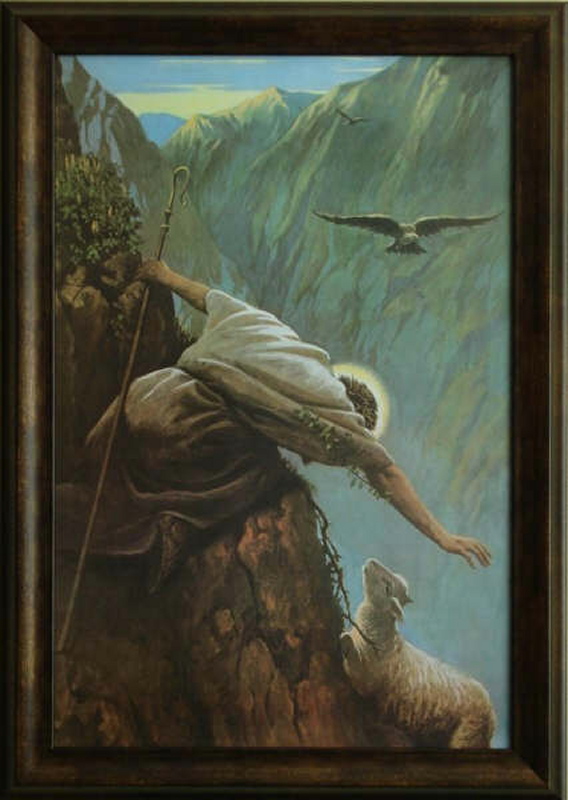 - In verses 13 and 14 the theme is developed further. The good shepherd knows well that the Father knows and loves all his sheep. This is a tricky question. It gives the impression that it is not merely a question of a shepherd liking his sheep. This would be to misunderstand the passage. The shepherd loves the sheep, but he is also very aware that his love for them did not originate with himself. He has received it from the heavenly Father in whose hands he lies.
- In verses 13 and 14 the theme is developed further. The good shepherd knows well that the Father knows and loves all his sheep. This is a tricky question. It gives the impression that it is not merely a question of a shepherd liking his sheep. This would be to misunderstand the passage. The shepherd loves the sheep, but he is also very aware that his love for them did not originate with himself. He has received it from the heavenly Father in whose hands he lies.
This is the deep reason why we lay down our lives to protect all our sheep. We know we will be persecuted by others for standing by our promises to accept this as part of our eternal destiny. This is what God wants for us. We acknowledge this and try our best to live up to it.
- Verses 15 - 16: There are other sheep who we know do not belong to us here and now but we are still attached to them. They are not part of our own community, but we know that the Father knows and loves them all. The Father recognises too that they will have to become one. Soon they will all be together, living with peace under one Shepherd. As Christians we know too that we will be one of those who are called to be among them as their shepherds.
- Verses 17 - 18: What the Father loves about the Good Shepherd is stated more clearly. He loves him because he lays down his life and will soon take it up again. This is a particular aspect of the passage which we can give some stress to. No one takes our life from us. We lay it down of our own free will. As it is in our power to lay it down and take it up again, this is what we do with the various temptations God sends us in our lives. We know how to accept them and do something important about them.
This is not something we have thought out for ourselves. It is a great and glorious commandment which we have received from our Father who continues to dwell in heaven.
Prayer Reflection
"With this people, it costs nothing to be a good shepherd." ... Archbishop Romero
Father, we thank you that you have called us to be shepherds of your flock.
Like all good shepherds we are willing to lay down our lives for the sheep. We are not like hirelings, who looks after your sheep because of the importance they have received from them. 
Since the sheep do not belong to them,
they abandon them and run away as soon as they see a wolf coming.
Then the wolf attacks the sheep,
and scatters them in whatever direction they are willing to go. This is because they are only hired men and have no concern for the sheep.
“A man ought not to consider his chance of living or dying. He ought only to consider on any given occasion whether he is doing right or wrong.” ... Socrates
Lord, we thank you that you have loved your sheep with your personal love
and then handed them over to us. Because we know you,
we can lay down our lives for your sheep,
knowing that we will beg for new life for them.
"We think we are fleeing from God, but in fact we are running into his arms." ...Meister Eckhart
Lord, there are many sheep you have who are not of our fold,
but you want us to lead them as well. We thank you for having given them to us
so that very soon there will be just one shepherd
and we know that we will be among those who will lead them.
"Prayer is not given to us to change the world.
It is meant to change us so that we can change the world." ... Sr Joan Chittister
Lord, we thank you that you love us because we have power to lay down our lives
in order to take them up again.
No one takes our lives from us.
We lay them down of our own free will
and it is in our power to take them up again.
This is the great and glorious command
we have received from our Father who is in heaven.
Lord, we pray at this moment for the military personnel in Iraq.
A few years ago Pope Francis went to Iraq to pray and appeal for peace between the Shia Muslims and Christians. As the timing of the visit was criticised, The Holy Father was willing to lay down his life for his faithful. We need to keep all who are suffering in war and dangerous conditions; whether in Ukraine, Gaza the Congo, South Sudan, and all those other countries too where people are suffering in silence.
Lord, we thank you for all those sons and daughters of ours who will give themselves in the service of your people as Good Shepherds.
***********************************
Thomas O'Loughlin
Liturgical Resources for the Year of Matthew
www.columba.ie
Introduction to the Celebration
One of the gentle images that we find applied to God in the Old Testament is that the Lord is the shepherd of his people: The Lord is my shepherd, there is nothing I shall want. We Christians apply this title to Christ the Lord. He is the good Shepherd who knows his sheep and lays down his life for them. We may find this language of sheep and flocks and shepherds strange, but beneath the imagery the belief it points to is at the heart of our faith: God is gentle, concerned, caring and just.
Homily Notes
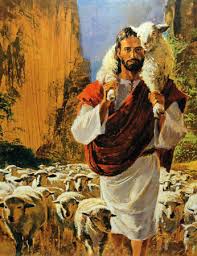 1. The language of shepherding, of sheep, and of flocks is, historically, very much part of the church's self-understanding. We refer frequently to 'pastors,' 'pastoral work,' 'the flock,' the pastoral staff (crosier), 'the defence of the church from wolves,' and so forth. This language is often objected to by Christians today as patronising power-language. 'While before God we acknowledge our need to be disciples, when men set out to pastor us it is often all too clear that they treat us like sheep' (remark of someone to me after hearing the Good Shepherd gospel in 1995).
1. The language of shepherding, of sheep, and of flocks is, historically, very much part of the church's self-understanding. We refer frequently to 'pastors,' 'pastoral work,' 'the flock,' the pastoral staff (crosier), 'the defence of the church from wolves,' and so forth. This language is often objected to by Christians today as patronising power-language. 'While before God we acknowledge our need to be disciples, when men set out to pastor us it is often all too clear that they treat us like sheep' (remark of someone to me after hearing the Good Shepherd gospel in 1995).
Moreover, most of the images of this shepherding are power-oriented: crosiers are things people get 'rap's of (or belts) of in common language and in the formal language of the law bishops are appointed to, or resign from, 'the actual pastoral government'. For someone in a formal position of authority, e.g. a priest 'in full uniform' at an ambo, to say that 'Jesus left us a pastoral ministry in the church' can seem like a piece of 'user-friendly' 'official-speak' meaning 'the command structure has divine sanctioning it is irrelevant whether this is true or not, this is how much of the shepherd / sheep language is received. It must be used with an awareness that it is a debased currency and that ecclesial structures built with this language may also be in need of revision.
2. The identification of the presbyteral ministry with the work of the Good Shepherd on this Sunday presents that ministry as an elite group which stands in distinction to those for whom they are pastors: they lead, guide, defend, and stand to that group as Christ stands to the whole church. These are very direct and powerful symbols, but symbols we use comfortably as they seem hallowed by use. However, it is important to note how problematical this whole symbol system is and how it can create a very false view of the nature of the church. How often do we use two-tier language of leaders/led, clergy/lay, or military language or 'army of priests' or 'the troops'. Such metaphors presuppose a univocal view of authority where the work of Christ is virtually that of the ordained, and this can be seen in terms of a hierarchy. Any genuine discussion of ministry, from the most private ministry of one Christian to another to that of Petrine ministry seen around the globe, must begin with the fact of each baptised person having a skill/ gift/ talent in a unique way, in a specific situation, so that another can experience the presence of the caring Christ, and thus the kingdom can in some particular way be realised.
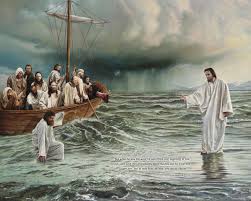 3. Focusing on the ordained priesthood as a direct continuity with Christ runs to risk of failing to note that his priesthood is unique: he has an unique relationship to the Father, and he establishes an unique relationship with us which is like it. Likewise, an emphasis on 'vocations to the priesthood and the religious life', if not seen as an exceptional expression of the basic reality of each person needing to be aware of their call to minister, creates an imbalance in the our preaching and involves the possibility, not unknown in practice, that the basic nature of vocation might be ignored and people might reduce 'vocation and 'ministry' to these high-visibility tasks.
3. Focusing on the ordained priesthood as a direct continuity with Christ runs to risk of failing to note that his priesthood is unique: he has an unique relationship to the Father, and he establishes an unique relationship with us which is like it. Likewise, an emphasis on 'vocations to the priesthood and the religious life', if not seen as an exceptional expression of the basic reality of each person needing to be aware of their call to minister, creates an imbalance in the our preaching and involves the possibility, not unknown in practice, that the basic nature of vocation might be ignored and people might reduce 'vocation and 'ministry' to these high-visibility tasks.
4. So the basic question we must address in homilies today is how are we to view ministry. Each of us lives in a connected series of worlds: family, close friends, the people we work with, the local community, the Christian community assembled, the town, county, country, Europe. We interact at all these levels: we need them and contribute to them; we are needed by these as well. This is most obviously the case in the worlds that are close to us: we need others and they need us.
This human interaction is the concrete base of ministry. We are brought towards the perfection we all desire and pray for, the kingdom, by the drawing love of the Father in Christ, but this becomes a visible fact through human hands and minds and voices. In each situation we find ourselves – and our spheres of ministry are all unique to us and of different extents – others are helping us towards the goal (i.e. those who minister to us: spouses supporting and encouraging, children making us love less selfishly, people who help us make life run smoothly from petrol pump attendants to politicians (note we use the language of ministry here: 'ministers' and 'civil servants'), to those who witness to the truth and help us towards understanding such as teachers, to those who help us in sickness, to those who provide food, and those who have special skills in the Christian community.) And we help others towards the goal (our ministry). To be a Christian is to be aware of the relationships that bind us and to have an attitude of care and contribution because we believe that in Christ the kingdom is not a dream but a divine promise.
5. To believe in the risen Christ involves seeing life with hope. We join in the task of life as more than just sets of contracts ('I scratch your back, you scratch mine'). Contracts may be necessary to protect us from exploitation, but we believe that there is something more and we are called to witness to it. To act as a Christian is to be aware of how we affect others, and are affected by others, for good or ill, and to act knowing that Christ acts as a good shepherd: he stands by us and brings us into a life of love such as that he shares with the Father. Fr om the Father to the Son, from the Good Shepherd to us, and from us to others: a pattern of love and care where the basis of interaction cannot be a system of contracts alone, but must draw on a generosity that flows from being members of a family and communities of hope
om the Father to the Son, from the Good Shepherd to us, and from us to others: a pattern of love and care where the basis of interaction cannot be a system of contracts alone, but must draw on a generosity that flows from being members of a family and communities of hope
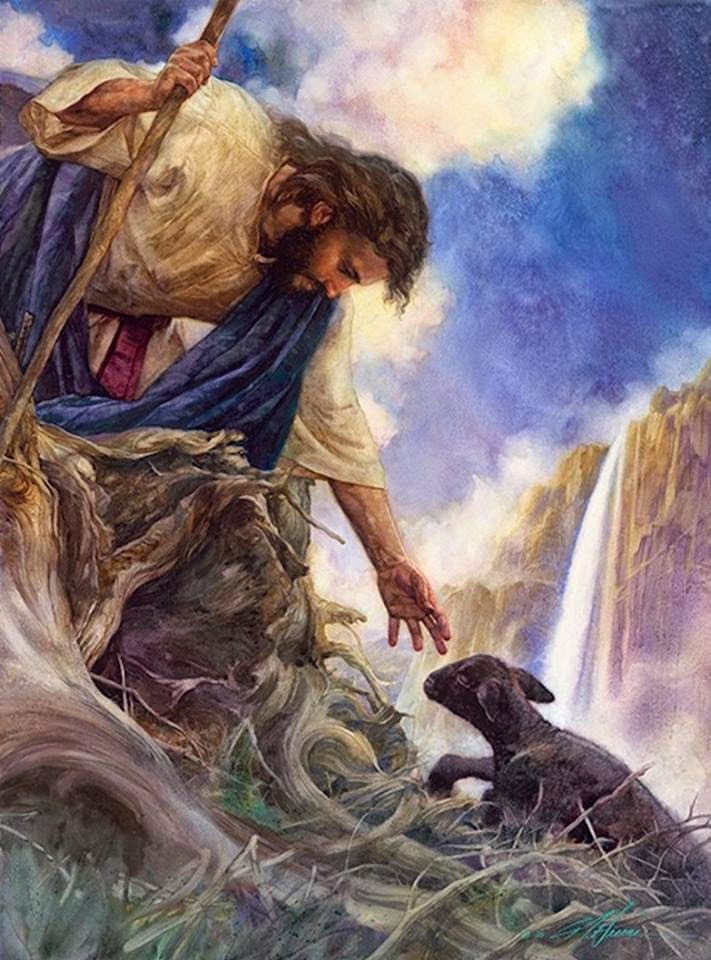 6. To talk about specific vocations, e.g. ordained ministry, before we make clear our Christian vision and give it visible expression in our external Christian structure, is to assume that the ordained minister is just one more 'service provider' — like the electrician or the solicitor — in a world of contracts: we need certain religious things for our survival, then let us 'buy them in' from the experts (priests in their special place of work: church buildings) and all can look on the priesthood as a job and the church as merely the functional organisation that organises the services required. This picture of priesthood and ministry — historically not unlike the tasks assigned to the various priesthoods of early imperial Rome — can be all too real and draws both non-Christians and Christians, indeed many priests, into its web. To reflect on the risen Shepherd is to challenge this view.
6. To talk about specific vocations, e.g. ordained ministry, before we make clear our Christian vision and give it visible expression in our external Christian structure, is to assume that the ordained minister is just one more 'service provider' — like the electrician or the solicitor — in a world of contracts: we need certain religious things for our survival, then let us 'buy them in' from the experts (priests in their special place of work: church buildings) and all can look on the priesthood as a job and the church as merely the functional organisation that organises the services required. This picture of priesthood and ministry — historically not unlike the tasks assigned to the various priesthoods of early imperial Rome — can be all too real and draws both non-Christians and Christians, indeed many priests, into its web. To reflect on the risen Shepherd is to challenge this view.
***********************************
Sean Goan
Let the reader understand
www.columba.ie
Gospel: John 10:11-18
In the tenth chapter of John's gospel, the focus is on the image of Jesus as the Good Shepherd. This language is to be understood in the light of Old Testament ideas that God was the shepherd of Israel and that their kings were meant to follow his example. Often they failed in this duty and the people were abandoned. It is also to be read in the light of what took place in chapter 9 with the man born blind. The Pharisees in that story represent blind leaders who are incapable of leading the people to God.
Jesus, on the other hand, as the Good Shepherd, is the one who lays down his life for his sheep. Not only that, he is aware of them not simply as a flock but he knows each of them individually and they know him. In John, the verb to know has a particular importance because it highlights the fact that coming to faith involves getting to know Jesus. It is all about a personal relationship. Each of is invited to come to know the one who lays down his life for us in an act of love.
Reflection
[caption id="attachment_80616" align="alignleft" width="364"]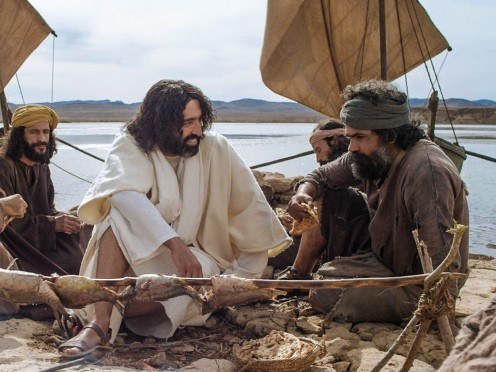 After his resurrection Jesus explains to the apostles how God really works .[/caption]
After his resurrection Jesus explains to the apostles how God really works .[/caption]
In this time between Easter and Pentecost we might be tempted to think of these events as historical moments in the distant past which gave rise to the religion which we practice today. This religion for many is then seen as a moral code by which they live in the hope of attaining heaven.
For Peter and John, however, the Christian experience was something very much in the here and now. They felt that their lives were driven by the Spirit of Jesus which made them aware on a daily basis of how God was at work in the world and in their own hearts. These readings are a powerful witness to the terrific dynamism which characterises a genuine Christianity. If it seems too far removed from our experience perhaps it is a sign that we need to invite the Holy Spirit to reawaken in us the joyful energy which comes from understanding the love that the Father has lavished on us. We are challenged to come to know Jesus as our Good Shepherd who even now leads us to restful waters and gives us repose.
************************************
Donal Neary SJ
Gospel Reflections
www.messenger.ie/bookshop/
Called at Baptism
Following one’s vocation is a response from within to the needs outside us. A decision to work for the poor or assist people in need is not necessarily a vocation. A vocation meets the human needs of the world but with a motivation from within. We care for our children and grandchildren not just because they are sick or insecure, but because we love them. this love will move us out to help them in various situations.
We find a call to be ‘people for others’ because our heart teaches us that with Jesus we are all brothers and sisters, and that God wants to save the world, and needs our help to do so.
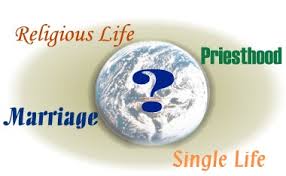 This is the Sunday we all pray that our particular vocation in life may become clear and may become stronger.
This is the Sunday we all pray that our particular vocation in life may become clear and may become stronger.
God calls each of us to love God and love our neighbour. This is the first Christian calling at our Baptism; we then find the best way for each of us with our own particular set of gifts, talents and even weaknesses to live out that call to love.
We think especially today of religious life and priesthood. There are needs for priests, sisters and brothers in most parts of the world. as a community in families and parishes we thank those who have given their lives in these vocations and pray they may increase.
Remember with thanks those whose lives
have given you your faith in God.
Lord, thanks for what I can do in your service.
May your kingdom come!
********************************************************